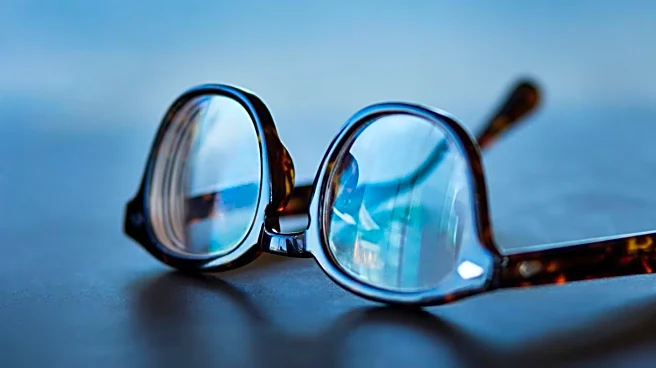What's Happening?
The increasing use of digital devices has led to concerns about digital eye strain and blue light exposure. Blue light glasses, designed to filter out blue light from screens, have gained popularity as a potential solution. However, according to the American Academy of Ophthalmology, there is no scientific evidence that blue light from screens causes eye damage, nor do blue light glasses effectively reduce symptoms of digital eye strain. The American Optometric Association describes digital eye strain as a collection of vision-related problems resulting from prolonged use of screens, including blurry vision, dry eyes, headaches, and neck pain. Despite the popularity of blue light glasses, experts suggest alternative methods such as the 20-20-20 rule to alleviate eye strain.
Why It's Important?
The debate over the effectiveness of blue light glasses is significant as it impacts consumer choices and health practices related to screen use. With the rise in digital device usage, understanding the real effects of blue light and effective methods to mitigate eye strain is crucial for public health. The conflicting evidence about blue light's impact on vision and sleep patterns influences both the eyewear industry and consumer behavior. If blue light glasses are not effective, consumers may need to explore other strategies to protect their eyes and improve sleep quality, affecting sales and marketing strategies for eyewear companies.
What's Next?
As research continues, consumers and health professionals may seek more definitive answers regarding the impact of blue light on eye health and sleep. The eyewear industry might need to adjust its marketing strategies if blue light glasses are proven ineffective. Additionally, public health campaigns could focus on promoting alternative methods to reduce digital eye strain, such as screen time management and ergonomic practices. Further studies could lead to new guidelines from health organizations on managing screen exposure and protecting eye health.
Beyond the Headlines
The discussion around blue light glasses also touches on broader issues of consumer trust and scientific literacy. As consumers navigate conflicting information, the role of scientific research in guiding health-related decisions becomes increasingly important. This situation highlights the need for clear communication from health organizations and researchers to ensure the public makes informed choices. Additionally, the focus on blue light glasses reflects a growing awareness of the impact of technology on health, prompting discussions about digital wellness and responsible tech use.









